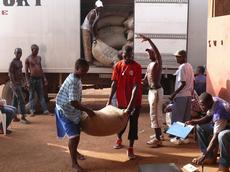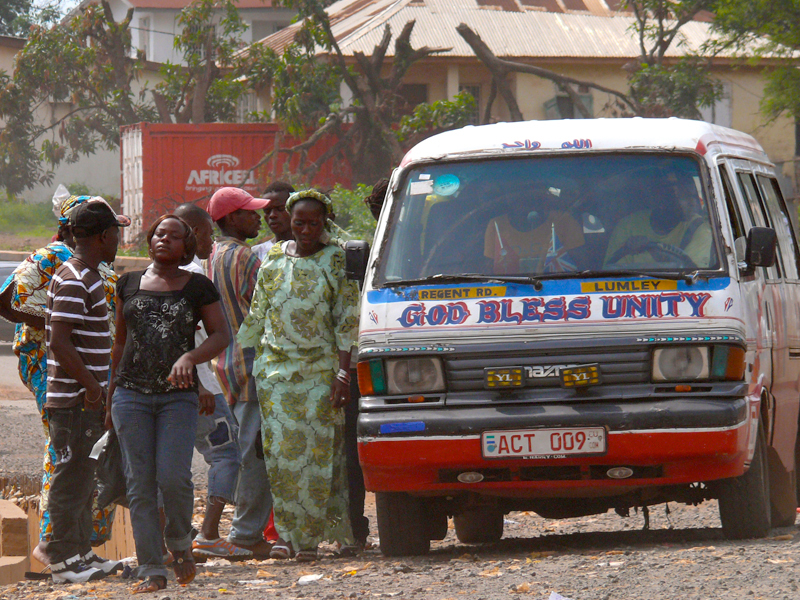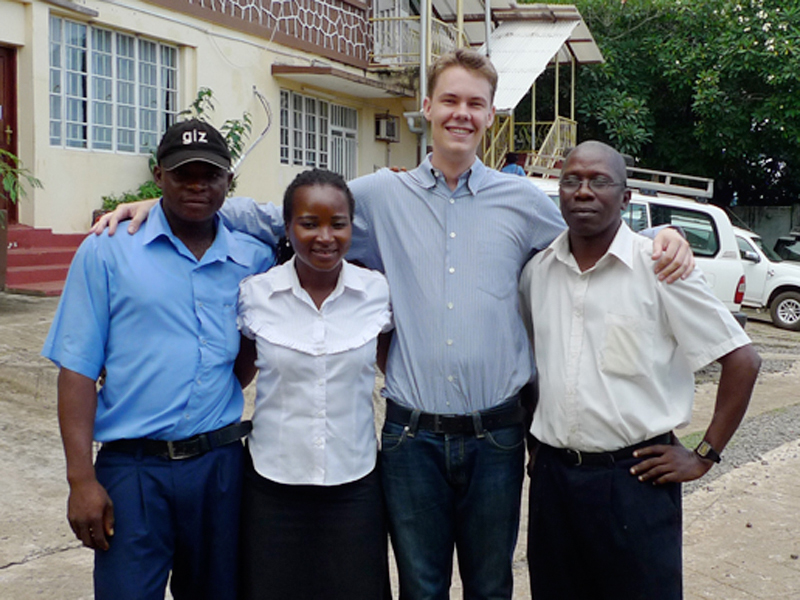All in a day’s work
Pablo Padrutt is a programme assistant at the German Society for International Cooperation in Sierra Leone. In his first Globetrotter article, the NADEL student recounts the trials and tribulations of everyday life in the country.

Working in an employment development programme was
always going to be challenging on account of Sierra Leone’s weak state
structures, that much was clear. I tried to prepare myself for the hot and
sticky climate by going to the sauna, too. But as it turned out, everyday life
in Sierra Leone has more pleasures and pitfalls than I expected: whilst the
country is surprisingly safe – so much so that I can walk around the dark,
labyrinthine streets alone at night without a second thought – the poor infrastructure
presents a new challenge every day. The country hardly has any tarmac roads and
the power and water supply is constantly on the blink, even in the capital,
Freetown. I was soon able to get round the problem of malaria and food
poisoning thanks to imported tablets, but I sometimes worry about the lack of
basic healthcare. On the flipside, however, the dream beaches outside the city
make up for the daily challenges I face. And the spontaneous conversations with
Sierra Leoneans are also a highlight: the standard inquiries into your
well-being, how well you’re sleeping, your work and family are often followed
by illuminating and amusing discussions with complete strangers.
Sardine-tin buses or clapped-out taxis
When I’m not off working in the far-flung southern and south-eastern corners of the country, on paper my daily routine isn’t all that different to anybody else’s: going to the office, working, coming home, cooking and sleeping. But even the first task – going to the office – is an adventure in Sierra Leone: it usually involves walking along bumpy dust roads in the stifling heat to the nearest tarmac road to wait for one of the privately operated Toyota minibuses. Even though the seats have been torn out to make room for five rows of tightly packed metal benches, the demand exceeds the supply: sometimes you have to wait for up to an hour for one of the precious spots with your mouth full of dust.
If you don’t fancy the sardine-tin buses, you can always keep your eyes peeled for a clapped-out taxi, which usually splutter down the main streets with five passengers crammed into four seats. If you’ve kept a taxi driver’s mobile number, you also have the luxury option of calling a taxi to your house and hiring a cab to yourself all the way to work. As there isn’t a single light signal and only a few dozen road signs, though, you can only do so with taxi drivers who have already driven you home. Whether they actually turn up is also in the hands of the Gods: on average, they come every four attempts. One of my taxi drivers recently had malaria, the second had lost his car, the third overslept every morning and the fourth insisted on an advance.
Now, after four months of sweaty minibuses and taxi
stress, my quality of life has taken a sudden turn for the better: a few days
ago, after a bureaucratic marathon through all the red tape, I finally got a
second-hand car imported from Switzerland. The old Toyota with air-conditioning
and four-wheel drive is just the job for Freetown’s bumpy roads, which turn
into muddy torrents in the merciless rainy season.
Working with absent participants
When you reach the office
covered in dust and sweat, it’s as if you’ve entered another world: pleasantly
air-conditioned and, thanks to a generator, usually with power, the office is a
mini-oasis. However, as the Internet operates via satellite, it only offers a
low bandwidth, so I sometimes end up battling with it for half a day to send an
email with an attachment. If you’re supposed to do something with people from
outside, things rarely go according to plan and the fact that registered
participants simply don’t turn up (“too much traffic”), won’t leave their
offices because it’s bucketing down or are sidelined with malaria doesn’t make
the job any easier, either. Getting the government involved in local economic
development is difficult, too: the entire department responsible for livestock at
the Ministry of Agriculture, for instance, has an annual budget that’s slightly
lower than my salary last year as a project manager in the Swiss Federal
Administration.
Manioc, rice or expensive imports
I can change the 100-dollar
bills I brought in from Switzerland into fat rolls of local currency at the
supermarket. A large proportion of it goes straight on shopping: a box of
Kellogg’s Cornflakes easily costs ten dollars. Almost all the food is imported.
Nine years after the war, the country still hardly produces enough of anything to
stock the markets in the city bar manioc and rice. Moreover, the manufacturing
industry is still very much in its infancy. When I’m at home, I can rarely
motivate myself to cook anything in the somewhat chaotic kitchen of my wealthy
Sierra Leonean landlord’s family. Instead, I go to the Lebanese restaurant
nearby, where they offer culinary alternatives to the ubiquitous rice with
manioc leaves.
Party tunes and rattling generators
Fortunately, my landlord’s house has a generator, which means I have the pleasure of coming home to an air-conditioned room every evening and don’t have to lie awake in bed drenched in sweat anymore. However, it also means I can hear the generator happily rattling away well into the wee hours. And as noise control is not an issue here, at night you can often enjoy the sound of party tunes booming out through overloaded speakers, yapping stray dogs, shrieking muezzins and vociferous Free Church preachers. And since the beginning of the rainy season, frogs have now joined the chorus outside my window, too, adding a pleasant, almost rural accompaniment.
About the author
Pablo Padrutt is a programme assistant at the German Society for International Cooperation (GIZ). The twenty-six-year-old is currently on a ten-month placement in Sierra Leone as part of the post-graduate degree for developing countries NADEL at ETH Zurich, working for an employment development programme geared towards marginalised young people. Before his post-graduate degree, Pablo Padrutt studied international relations in Geneva and Buenos Aires and peace policies for the Swiss Federal Department of Foreign Affairs (EDA).









READER COMMENTS